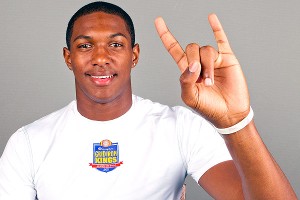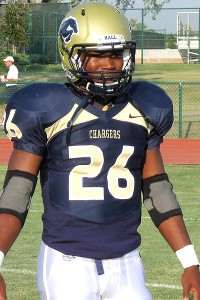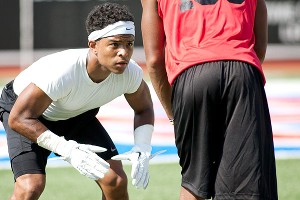 |
| Barry Sanders |
 |
| Barry Sanders Jr. |
Written by: Mitch Sherman
The names on the jerseys look familiar -- Sanders, Lewis, Griffey, Combs, Taylor -- and the moves on the field almost always give it away. They are the sons of famous athletes and entertainers.
It's never easy for these players to make a name for themselves on the field. The expectations can often be overwhelming. Fans expect every run to be a touchdown, every defensive play to be a pick or a sack. When the dads come to watch them, it can be a huge distraction as fans want autographs or pictures. They might be stars in the NFL or MLB or entertainment fields, but at the end of the day, they're still just dad to their son on the field.
While it takes hard work, several have managed to be more than just the son of the famous dad but prospects in their own right, and here's a look at several from the 2012 and '13 classes. On the slideshow you can view information about the father & son by enlarging the screen and then clicking "Show Info" on the upper right hand corner. Click for ESPN Rising Sons.
Iconic football coach Bill Redell employs only a few rules in building his staff at Oaks Christian High School in Westlake Village, Calif.
Chief among them: He won't hire you if your son plays on the team. Unless, of course, you're Joe Montana. Or Clay Matthews.
Montana assisted Redell when Nick Montana, son of the four-time Super Bowl-champion quarterback, played the same position at Oaks Christian in 2008 and 2009. And Matthews, who played 278 NFL games over 19 seasons and fathered two NFL linebackers -- including Oaks Christian graduate Casey Matthews -- serves as defensive coordinator under Redell.
"I'll lift my policy for Joe Montana or Clay Matthews," Redell said, "not if you're some guy who played third-string at Cal State Northridge and wants to coach your son."
While Redell, the owner of eight California Interscholastic Federation championships, acted as any sane coach likely would, his acceptance of Montana and Matthews underscored a key component of our celebrity-driven society: Special treatment is everywhere.
And it's not always a good thing.
Nationally, the Class of 2012 contains an abundance of celebrity children, including the football-playing sons of Barry Sanders, Ken Griffey Jr.,Deion Sanders, Ray Lewis, Bruce Smith and musician Sean "P. Diddy" Combs.
Along with the notoriety, children of professional athletes and entertainers face troubling pressures and expectations.
They've handled it well at Oaks Christian, a private and pricey school near the Hollywood Hills that two years ago featured Nick Montana on the same football team with Trevor Gretzky, son of hockey legend Wayne Gretzky, and movie star Will Smith's son, Trey Smith.
Word leaked in the summer before Montana's junior year that he had transferred from powerhouse Del La Salle High School in Concord, Calif., to Oaks Christian. Soon, paparazzi showed up at the school, Redell said. Security became a hot topic.
"I noticed a lot more press, and we expected that," the coach said. "But we had to be aware of everyone who was around."
The younger Montana, now a redshirt freshman QB at Washington, handled the situation with grace and humility, Redell said, in large part by following the example of his parents.
"I played in the NFL for three games," Redell said, "and if we had a conversation for five minutes, I'd probably mention it. Joe Montana may be the greatest to ever play, but doesn't talk about his success."
Same goes for Gretzky and Smith.
"I can't say enough about all of them -- the parents and their children," Redell said.
The elder Jones talks regularly about the potential pressures with Cayleb, who is No. 83 in the ESPNU 150 as a senior at Stephen F. Austin High School in Austin, Texas. In part because of the shared insight, Cayleb operates mentally more like a 25-year-old athlete, his father said, than an 18-year-old.
"Communication is most important," Robert Jones said. "We talk about all the negatives and positives. I don't think Cayleb feels any pressure following in my footsteps. The only pressure, I think, he feels is being able to play right away when he comes into Texas."
Sports today are littered with legacies. But for every success story like Peyton and Eli Manning, Brett Hull or Grant Hill, dozens in their situations don't fare as well.
And athletics hardly hold a candle to the family undertones of the entertainment industry, with its storied names like Clooney, Douglas, Fonda, Jackson and Osmond. Sports and show business mirror each other in placing a heavy burden on offspring of the rich and famous who choose to enter the public eye.
Why do some fly so high while others flop? There is no definitive answer, but there are plenty of factors that will shape the future for the Class of 2012 celebrity legacies.
The pressure comes from all directions
"We live in a world where the extraordinary is considered normal," Lebowitz said, "and if you're not exceptional, we can find somebody else who is."
"Part of that is simply the unbearable burden of disappointing their parents," said Mark Anshel, professor of sport and exercise psychology at Middle Tennessee State.
And don't forget, said Steve Ettinger, author and fitness expert, another peer group makes it tough to succeed as the child of a superstar.
"If you're the opponent," Ettinger said, "it's a big deal to tackle Barry Sanders' son."
On just how high a pedestal do we place prominent athletes? Ettinger, who grew up near Los Angeles and attended school with another of the Gretzky children, said he once walked past the Great One on the stairs at school. It was the highlight of Ettinger's eighth-grade year.
Still, Barry J. Sanders Jr., son of the legendary running back, said it's all worthwhile. A senior at Heritage Hall High in Oklahoma City, Sanders ranks 81st in the ESPNU 150 and sixth among running backs. He's considering offers from Alabama, Florida State, Stanford and Oklahoma State, where his dad won the Heisman Trophy in 1988.
"I take a lot of pride in being his son," Sanders said. "I know I can count on him for support, and he has always been there whenever I've had any questions about recruiting or anything, really."
Celebrity pitfalls are difficult to avoid
"There is a sense that because my father or mother was so good that it should never be my fault," Anshel said. "And ultimately that hurts growth and performance."
"Particularly, if you look at where these people are developmentally, it's difficult," said Michelle Maidenberg, a psychotherapist specializing in fitness-related issues and an adjunct professor at New York University. "This is a time to find their niche. During that stage of development, you're really trying to find your identity.
"But there's an expectation that if your father is an athlete, you've got to be as good."
Parents are rarely the problem
"I told him he must not have kids or he'd understand," said Thicke, best known for his starring role on the sitcom "Growing Pains" and a longtime friend of Gretzky's. "It's an even bigger thrill when your kids do well than when you do it yourself."
Still, Thicke never pushed his kids toward a career in acting or music. In fact, he discouraged it.
"I'm glad I made it look appealing, but I tried to tell them show business is fickle," Thicke said.
"You want them to follow their dreams and passions. By the same token, it's important to instill in them the realities that you're a longshot. The reason those guys get paid so much money is because their talents are so rare."
Thicke said he saw the same dynamic at work with Gretzky and his five children.
"I think people who have been through that understand it best as parents," the actor said.
It's maturity as much as it's athleticism and genetics
Across the board, teens fared only percentage points lower than adults. The teens' results, though, varied much more widely than those of older test subjects.
"There are plenty of young people at the top," Epstein said. "We forget this sometimes as a culture."
The point? Young people, athletes included, are unpredictable.
Add the element of celebrity, and success is all that much more difficult to predict.
"Because of technology, if the public eye is on you, you basically have the whole world watching," Epstein said. "For some, that might be a motivator. For others, it's devastating."
None of this psycho-analysis is required
According to Kramer, it's all about recognizing and harnessing your mindset. Athletes who face unusual pressure succeed while operating from a high state of mind.
"My guess is that Archie Manning understood this in his own way," Kramer said. "He understood it's one thing to preach the common doctrine to his kids -- live your life, don't follow me -- but he also knew if they didn't make decisions at the right time, they would become a victim of their own circumstances."
All of societal mantras only create more confusion, Kramer said.
"We're getting in these kids' heads when it's not necessary," he said. "A guy like Archie Manning, what he did best -- like a lot of clear-thinking parents -- he got out of his kids' way." Click for Original Article.



No comments:
Post a Comment